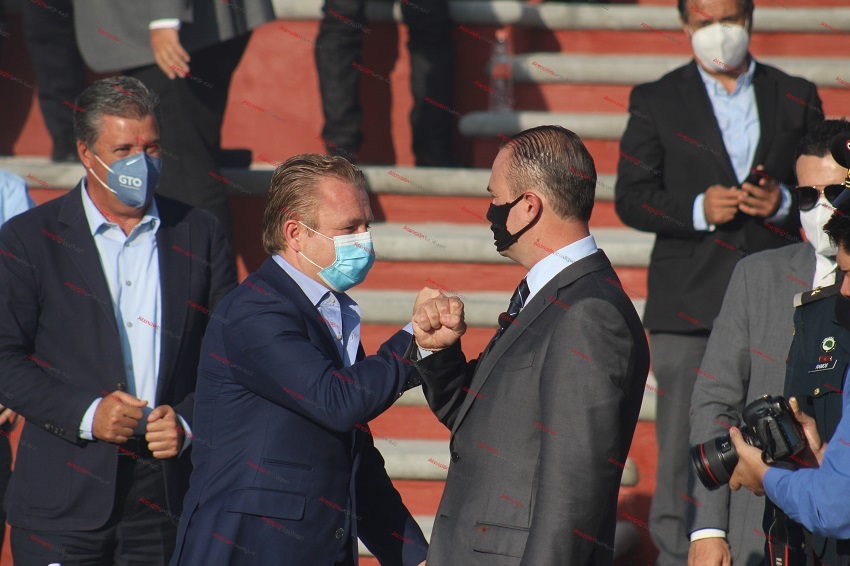Mayor Luis Alberto Villarreal delivered an annual “municipal results” report on September 21 at an intermediate point in this pre-election year. Speaking before state and federal representatives of his party at Zeferino Gutiérrez Park, he also announced his intent to run for office again.
Guests began arriving at 4:30pm. Directors, delegates, and neighborhood presidents came to view the speech on closed-circuit screens, while deputies, senators, and members of civil organizations and the city council—along with close friends of the mayor—entered the park’s amphitheater (with necessary sanitation measures), where the report was delivered. Meanwhile, at least a dozen people protested a new initiative underway for the management of public parks, which, if approved by the city council, would turn over administration of both Zeferino and Juárez parks to citizen boards.
Highlights
One of the actions on which the mayor reported was the San Miguel Iluminado (San Miguel Illuminated) program, through which 12,500 city lights will be changed from sodium vapor to LED. The municipality asked for a loan of 70 million pesos for the program, with the rationale that the annual electricity savings would be more than 7 million pesos and well worth the expense.
Speaking about security in the city, the mayor stated that San Miguel has 509 security cameras—one for every 196 residents—making it the third most video-monitored city in the country. Villareal also noted that police equipment and salaries for municipal police officers are the highest in Mexico. According to the Transparency page of the city’s website, the monthly salary for a public security officer, depending on rank, ranges from 14,000 to 27,000 pesos.
From January-August 2020, there were 27 intentional homicides, 4 home robberies, and 59 business thefts in San Miguel, according to the Public Security Executive Secretariat. This compares to 86 intentional homicides, 303 home robberies, and 153 business thefts between January and December 2019. The mayor celebrated these statistics and said that the reduction in crime has been achieved thanks to the Aqui No (Not Here) campaign, through which citizens, the government, and organized civic groups joined together to form the Committees for Welfare and Order, working as a team to improve security.
Another topic Villareal covered in his progress report was the city’s water supply, noting that according to the Program for Urban Development and Territorial Planning of San Miguel, Sanmiguelenses will have drinking water for at least the next 30 years, even with current population growth. This is due, in part, to the expansion of an almost 20-year-old wastewater treatment plant and construction of the AllendeAquifer—projects requiring an estimated investment of more than 380 million pesos. The treatment plant modernization should increase its water treatment capabilities from 60 to 300 liters per minute. Mayoru also said that the municipal government and SAPASMA have been in charge of purchasing land between San Marcos de Begoña, Flores, and Pantoja. It is from these lands that drinking water for the city will be drawn.
In the area of public works, the underpass at El Pípila, which will replace the roundabout, was a major point of discussion. The 326-million-peso expense was brought up, and the mayor assured listeners that the project will be completed on time. According to the plans of the SICOM (Offices of Infrastructure), the work is due to conclude on November 11. The 300 public works projects for roads, bridges, streets, borders, and educational infrastructure were also addressed, along with the construction of the Zeferino Gutiérrez Park for 40 million pesos and the remodeling of Juárez Park for more than 15 million pesos. The mayor stressed that these spaces are “for the safe meeting of our families” and will continue to be there for locals and visitors.
On ecological issues, he spoke of the Zero Plastic campaign approved by the city council, which forbids the use of plastic bags in stores and markets and imposes a ban on the sale and use of disposable plates or cutlery. He also spoke about the 82,100 trees planted in two years in communities like Agustín González, Doña Juana, Soasnabar, El Membrillo, Puerto de Nieto, and San Marcos de Begoña—all with the aim of soil recovery.
As a final point, the mayor praised actions that have made San Miguel a leader in the state and country in dealing with the pandemic. The city was commended for these efforts by the World Travel and Tourism Council. In addition, even with the pandemic, construction of five major hotels continues in San Miguel. What is yet to come in the last quarter of the year is the construction of four roads and the La Cieneguita bridge. This project will cost over 120 million pesos (an investment by the state), and it will provide safe passage and mobility to more than 200 communities.

